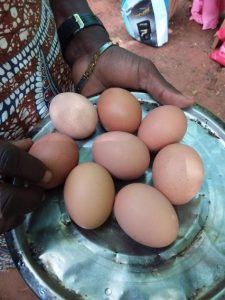
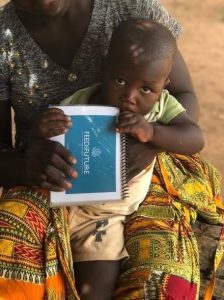
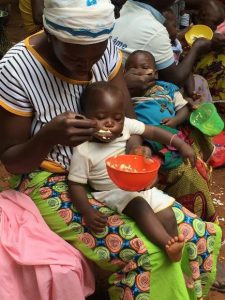
“Bicycle chicken” is a national dish in Burkina Faso, and even Bill Gates shared a video about it and blogged that chicken rearing can reduce extreme poverty. But what about the eggs?
Recent research in Burkina Faso, sponsored by the Feed the Future Innovation Lab for Livestock Systems, has found that educating mothers about the benefits of eggs can change the diets they feed their children in ways that produce rapid, significant improvement in nutritional status.
The change in behavior was profound. Before this research-based intervention, young children in 18 rural villages in Kaya District rarely ate eggs. Within four months, some children were eating an egg a day, and their mothers were impressed with the results. Problems with wasting and underweight both dropped significantly in less than a year.
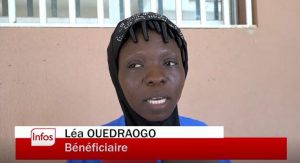
National television news covered the phenomenon in the summer of 2019, and one mother explained the process and its impact: “Eggs are valuable and we are now aware of it. Each of us received 3 chickens, and we the parents had to contribute one chicken so that we have sufficient production of eggs for the child’s nutrition. We have seen the importance of eggs for children, and they make the child more intelligent,” said Lea Ouedraogo in the broadcast (translated from French).
The mothers told the researchers that they were seeing improvements in their children’s resilience and psychomotor functioning. The leader of the research project, Dr. Sarah McKune from the University of Florida, heard them say that “’our kids aren’t getting sick. Something’s different about these kids.’”
Justification and Methods
The idea to pursue this research and dietary intervention germinated from discussions at an Innovation Platform meeting with stakeholders in Burkina Faso. Certainly, eggs are available, but rural people prefer to sell chickens and their eggs to gain income. Would poverty prevent them from changing their behavior? A prior pilot study in Ethiopia provided hope, and the leader of that study, Anteneh Omer of Hawassa University, joined Dr. McKune as a co-Principal Investigator. The other co-Principal Investigator was Dr. Aissata Wereme from the Institute of Environment and Agricultural Research (INERA-Burkina Faso).
To study the effects of an educational campaign, the project divided mothers into three groups of about 90 women each. One group served as a control, while the other two groups received training every two weeks about chicken husbandry and the importance of eggs for children under the age of two.
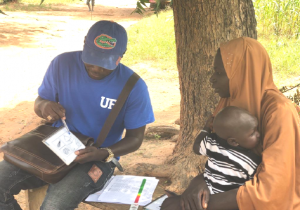
The third, full intervention group received three chickens in a ceremony led by a village leader. Participating mothers pledged to obtain an additional hen and to feed their child one egg daily. This group showed the greatest behavioral change, with nearly all children consistently eating an egg daily. Across the control, partial, and full study arms, mother-reported child egg consumption changed from nearly 0 to 1.0, 2.4, and 6.3 eggs per week, respectively.
This change may bring many benefits. An intervention in Ecuador in 2017 showed that it may nearly halve rates of stunting. The study in Burkina Faso is investigating such effects, and it has received an additional grant from the Livestock Systems Innovation Lab to expand its research into cognitive development.
Why did it work?
Instead of a single factor, McKune cites the project’s multi-pronged approach as a recipe for success. Messages were consistent, and a childproof, laminated flipbook used culturally relevant graphics to educate non-literate participants. She credits colleague Omer with fostering camaraderie among the project’s nearly 270 participants, and his approach included creating a jingle in the local language that they sang to inaugurate meetings: “One Child, One Egg, Per Day.”
The simplicity of the approach was another plus. “It feels so accessible, so doable. This is very low tech,” said McKune.
In addition to poultry production, the project targeted women’s empowerment as an essential ingredient. The trained women demonstrated it at the project’s closing event on May 28, 2019, when they trained the women in the control group on how to boil eggs and feed their children properly.
All participants expressed eagerness to continue sharing what they had learned. With the additional grant, the researchers can continue studying the process and effects of behavioral and dietary change.
Researchers spoke in November 2019 at the American Public Health Association meeting in Philadelphia. There is also interest to conduct the intervention in Niger and Rwanda.
 0
0
